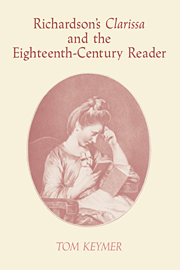Book contents
1 - Reading epistolary fiction
Published online by Cambridge University Press: 24 October 2009
Summary
In a Man's Letters you know, Madam, his soul lies naked, his letters are only the mirrour of his breast, whatever passes within him is shown undisguised in its natural process. Nothing is inverted, nothing distorted, you see systems in their elements, you discover actions in their motives.
Johnson to Mrs Thrale, 27 October 1777Very few can boast of hearts which they dare lay open to themselves, and of which, by whatever accident exposed, they do not shun a distinct and continued view; and certainly what we hide from ourselves we do not shew to our friends. There is, indeed, no transaction which offers stronger temptations to fallacy and sophistication than epistolary intercourse.
Johnson, Life of PopeFamiliar letters and the language of the heart
The classic period of the epistolary novel was also, in the writings of Pope, Horace Walpole, Lady Mary Wortley Montagu and others, the heyday of the familiar letter. For Howard Anderson and Irvin Ehrenpreis, the letter is ‘the exemplary form of the period’, which in its characteristic tones of candour and spontaneity ‘reflects the profoundly social quality of the age’. Other critics ground similar claims in the intimacy associated with the form. Keith Stewart has found in eighteenth-century epistolary prose an informality of style and substance which at its best made possible ‘the immediate representation of felt experience’, ‘suffused with the character, the personality, of the writer’. Bruce Redford, most recently, has traced the vigour and interest of what he terms ‘a specifically Augustan epistolary mode’ to a new sense of vocation on the part of its exponents, ‘a feeling that letter-writing is not merely a stopgap enterprise, but rather a campaign for intimacy with the other’.
- Type
- Chapter
- Information
- Publisher: Cambridge University PressPrint publication year: 1992



